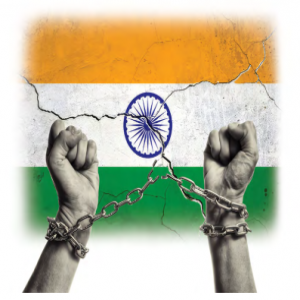
 Fr. Gaurav Nair
Fr. Gaurav Nair

As India celebrates yet another anniversary of its independence, the question of freedom and what it truly means for its citizens looms larger than ever. Recent events, such as the ongoing crisis in Bangladesh, the horrific rape and murder of a female doctor, and the disqualification of wrestler Vinesh Phogat at the Olympics, are a reminder of the myriad challenges the country faces today. These incidents raise critical questions about the state of freedom, justice, and India's global aspirations.
India's response to the crisis in its neighbourhood has always been less than satisfactory and, more often than not, inconsistent. In light of the situations within its borders, the Indian moral stance has weakened both within South-East Asia and universally. Agents of Hindutva exploiting the current situation in Bangladesh to sow discord within the country and abroad speak volumes about the government's commitment to secularism and equality.
The brutal rape and murder of a young female doctor in West Bengal shocked the nation. Despite the significant progress made in legal reforms and public awareness since the 2012 Delhi gang rape case, incidents like this continue to occur with alarming frequency. Similar crimes in other parts of the country failed to elicit the same concern. This selective outrage highlights a troubling trend: the politicisation of crimes based on the victims' or perpetrators' identities rather than a genuine concern for justice.
India's performance at the Olympics, particularly the disqualification of wrestler Vinesh Phogat, has sparked a national conversation about the state of sports in the country. Despite being a nation of 1.4 billion people, India has consistently underperformed on the global sports stage. This dismal performance, coupled with the disqualification of one of its star athletes due to a minor technicality, has left many questioning why a nation with such immense potential continues to falter.
The failure to win a single gold medal is not just a reflection of India's sports system but also a metaphor for the nation's comprehensive Olympic failures.
The common thread through these disparate issues is what freedom means in India today. True freedom is not just the absence of oppression but the presence of opportunities for all citizens to thrive, regardless of their background, gender, or religion. It is about creating a society where justice is not selective and where diversity is celebrated rather than homogenised.
Freedom in India remains incomplete without freedom from fear, particularly for women. The failure to ensure safety and justice for half the population reflects a deep flaw in the nation's understanding and implementation of freedom. Until women and minorities in India can walk freely without the constant threat of violence, the country's claim to being a free and democratic society remains hollow.
As we reflect on 77 years of our independence, it would have been expedient for Modiji to have focused on graver issues rather than demonstrate his prowess of giving extraordinarily long speeches.